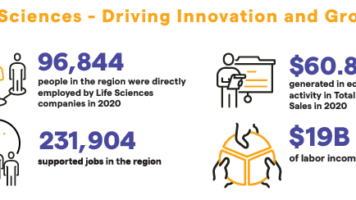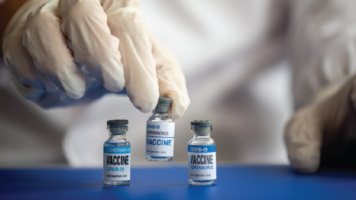Monthly Newsletter
California Life Sciences Commitment to Diversity, Equity & Inclusion
October 2021
There is no dispute that deep-seated, persistent healthcare disparities and inequities exist in California and across the nation. For communities of color, this is amplified by social and economic factors that contribute to racial disparities in health coverage, chronic health conditions, declining mental health, and increased mortality. These disparities are not a result of individual or group behavior but decades of systemic racism in economic, housing, education, criminal justice and health care systems. The COVID-19 pandemic brought this issue further into the forefront and shed a bright light on the need for diversity in the workplace, educational settings, health organizations, clinical trials, and research, in order to ensure access for all to life-saving treatments.
Alleviating health disparities will require a deliberate and sustained effort that addresses social determinants of health, such as poverty, segregation, environmental degradation, and racial discrimination. As part of the solution, life science companies have rededicated their commitment to diversity, equity and inclusion (DEI) initiatives. There is no single model program that works for all companies. Many have launched multiple programs to address this complex public health and societal dilemma. From hiring a more diverse workforce, to ensuring employees feel a sense of inclusion in their work environment, to partnering with historically black colleges and universities or increasing more diversity in clinical trials and research and development, life science companies have been reported to be leading the way.
Among some of the companies reasserting their continued commitment to DEI programs include: AbbVie, Amgen, AstraZeneca, Bayer, Biogen, Bristol Myers Squibb, Eli Lilly, Genentech, Gilead, GlaxoSmithKline, Johnson & Johnson, Merck, Novartis, Novo Nordisk Inc., Pfizer, Sanofi, the Vertex Foundation and many others. The links will take you to more information about each company’s DEI initiative.
In addition, companies like Amgen, Eli Lilly, Johnson & Johnson and Merck have joined the OneTen coalition of 37 of the largest US companies which aim to hire 1 million Black Americans into good-paying, family-sustaining jobs during the next 10 years.
Collectively, biopharma companies have committed billions of dollars in donations, training, tools, tech, and HR strategies to improve health equity and reduce health disparities in the US. Bristol Myers Squibb has committed over $300 million over the next 5 years to in large part increase diverse suppliers and continue to increase Black/African American and Hispanic/Latino representation at all levels of the company. Novartis and the Novartis US Foundation have pledged $13.7 million through a 10-year commitment with Thurgood Marshall College Fund, Morehouse School of Medicine, 26 other Historically Black Colleges, Universities and Medical Schools and others to address root causes of disparities in health and education. They will also invest $20 million for 1,200 Black and African American students to pursue health, science, technology, and business degrees. And AbbVie has made a $50 million investment in a five-year program to support health and education in underserved Black communities across the United States.
It’s important to note that a majority of companies have historically made significant investments in DEI-related programs not only to ensure their workforce represents the diverse patients they serve, but to ensure the entire drug development process includes diversity in clinical trials, suppliers, STEM education, and patient support programs, and increased outreach to at-risk communities providing disease awareness, education programs, and information.
Biopharma companies are in it for the long haul and committed to systemic solutions to achieve real, measurable results now and well into the future.
For more information, contact Patty Cooper with the California Biotechnology Foundation at 916-764-2434 or [email protected].



